| Srl | Item |
| 1 |
ID:
120791


|
|
|
|
|
| Publication |
2013.
|
| Summary/Abstract |
HIV sensitisation campaigns often aim to empower people living with HIV or AIDS (PLWHA) to enable them to cope with their illness by getting on with normal life as best as they can. However, contained within these messages are implicit assumptions about the needs of PLWHA. This research found that in Jamaica PLWHA's reproductive health needs are considered to be met largely by condoms. However, PLWHA respondents in this study expressed desires to have children and felt that their right to this was being denied. As such, dominant HIV sensitisation messages fail to respond to Jamaican PLWHA's own perceptions of their needs. This information is of importance, as the focus of the international HIV response moves away from simply preventing new infections to supporting those who have already been infected through locally appropriate interventions. As part of this, local perceptions need to be acknowledged 'up-stream' in HIV programming.
|
|
|
|
|
|
|
|
|
|
|
|
|
|
|
|
| 2 |
ID:
099223
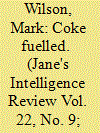

|
|
|
| 3 |
ID:
111173
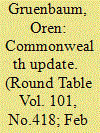

|
|
|
|
|
| Publication |
2012.
|
| Summary/Abstract |
Militant Islamists terrorised Nigeria, killing hundreds in indiscriminate attacks. The Bangladesh army said it had foiled a coup attempt, while in Pakistan the army seemed closer to launching a coup itself. New Zealand's leader won a second term, Jamaica and Guyana elected new ones, but rival prime ministers vied for power in Papua New Guinea. Fiji lifted martial law. South Africa saw a global deal to combat climate change agreed in Durban but the government was criticised for resurrecting apartheid-era controls over the media. A Malaysian judge threw out a sodomy case against the opposition leader Anwar Ibrahim that was widely seen as politically motivated, and the Federated Farmers of New Zealand called for sheep shearing to become an Olympic sport.
|
|
|
|
|
|
|
|
|
|
|
|
|
|
|
|
| 4 |
ID:
116301
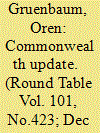

|
|
|
|
|
| Publication |
2012.
|
| Summary/Abstract |
The boy was 16 when his father found pictures of naked men in his school bag. The father went to Dunoon Park technical high school in east Kingston and began yelling in Jamaican patois that his son was gay and needed to be taught a lesson. Pupils began tearing benches and desks apart for clubs and beating the 11th-grade student while his father reportedly looked on smiling. A teacher said the mob swelled as people from outside the school joined in. The father then drove away.
|
|
|
|
|
|
|
|
|
|
|
|
|
|
|
|
| 5 |
ID:
075025
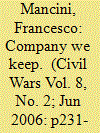

|
|
|
|
|
| Publication |
2006.
|
| Summary/Abstract |
Private companies play an increasingly important role in security sector reform (SSR). Bilateral donors and multilateral organisations are making use of the services of contractors to conceptualise and implement reforms to institutions that provide public security. The rapid increase in the outsourcing of SSR and the belief that the private sector's role in SSR will continue to expand in the future calls for a dispassionate analysis and debate on the role of the contractors and the benefits and risks outsourcing entails. This article investigates the role of one particular subset of contractors involved in SSR - management consultants - taking as a case study the work of Atos Consulting, subcontracted by the UK Department for International Development, in reforming the Jamaican police.
|
|
|
|
|
|
|
|
|
|
|
|
|
|
|
|
| 6 |
ID:
149867
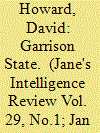

|
|
|
|
|
| Summary/Abstract |
Security improvement achieved in Jamaica after the extradition of gang leader Christopher Dudus coke appear to be under threat. David Howard examines how organised crime and the authorities respones will develop in the next five years.
|
|
|
|
|
|
|
|
|
|
|
|
|
|
|
|
| 7 |
ID:
151513


|
|
|
|
|
| Summary/Abstract |
Structural adjustment policies (SAPs) facilitate the hollowing out of the traditional roles performed by states. As a consequence, private entities (some perverse) offer services the state is incapable of or unwilling to provide. Beginning in the 1980s, SAPs plunged neighbourhoods in Latin America and the Caribbean into socioeconomic, and political disorder. This paper assesses the relationship between neoliberal reforms to the Jamaican state and the metamorphosis of violence since the mid-1980s. Neoliberalism transformed violence in Jamaica by increasing inter-gang conflicts, shootings and gang-related murders in Kingston’s garrisons. It also transformed political enforcers into community dons who use violence as a tool for business transactions in the international drug trade, and as a method of gaining local respect and authority.
|
|
|
|
|
|
|
|
|
|
|
|
|
|
|
|
| 8 |
ID:
079664
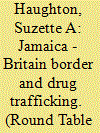

|
|
|
|
|
| Publication |
2007.
|
| Summary/Abstract |
Increasingly global features have created new defining descriptions of borders outside the traditional notion of 'geography' or 'natural' border characteristics. But within the context of these new defining features emerge border problems similar to those experienced by geographically adjacent territories. The fresh concept of a Jamaica - Britain border is defined by differences between the economy of the former as a developing state and that of the latter as a developed state. This defining characteristic fosters the two main border problems, illegal immigration and drug trafficking, via lucrative opportunities for a better life and huge profits from drug sales. As a far more dominant border problem, drug trafficking has connected Jamaica and Britain in a drug producing and consumption web. The problematic nature of this connection has heralded bilateral efforts to curb drug trafficking across the Jamaica - Britain border. The result has been the strengthening of a Jamaica - Britain focus on border problems, particularly on drug trafficking but also on illegal immigration matters in terms of their connection to drug trafficking. This article analyses the basis for a Jamaica - Britain border. Within that context it examines the problems affecting this border. It demonstrates that Jamaican - British agreements have proven beneficial in curbing border problems across the Jamaica - Britain border region
|
|
|
|
|
|
|
|
|
|
|
|
|
|
|
|
| 9 |
ID:
117510


|
|
|
|
|
| Publication |
2012.
|
| Summary/Abstract |
Jamaica is one of the few Commonwealth countries that still recognises the Privy Council in London as its court of final appeal. This article argues that the monarchy in Jamaica should be replaced by a republican form of government and that the Privy Council should be replaced as the final appellate tribunal by the Caribbean Court of Justice. In the view of the author, this is an issue that goes to the heart of the identity and self-image of the Jamaican people, and it is rooted in the cry for freedom of Jamaicans' enslaved ancestors.
|
|
|
|
|
|
|
|
|
|
|
|
|
|
|
|
| 10 |
ID:
082249


|
|
|
|
|
| Publication |
2008.
|
| Summary/Abstract |
The level of foreign direct investment (FDI) in the hotel sector of the tourism industry in Jamaica is unprecedented. This study seeks to understand the motivation for such investments using the extant theories of FDI as the conceptual framework. To achieve this aim, the study draws on the qualitative analysis of data gathered through face-to-face interviews with hotel managers, government policy makers and ambassadors from the investing countries to shed light on the issue. The conclusions reveal that intense competition in the home market has forced the multinational enterprise to seek markets abroad. Jamaica was chosen as a location because of its proximity to the US market and also the level of infrastructure development in the economy. However, because of the service-oriented nature of these multinational enterprises, the investors opted for FDI instead of other entry modes. These FDIs have changed the structure of the tourism industry in Jamaica and have led to increased levels of competition in the industry which, this study argues; is healthy for improved competitiveness in the industry
|
|
|
|
|
|
|
|
|
|
|
|
|
|
|
|
| 11 |
ID:
189467


|
|
|
|
|
| Summary/Abstract |
In response to broader political and corporate tendencies towards ‘techno-solutionism’, critical studies of security technology highlight the threat that security technologies pose to civil rights and democratic accountability. This article argues for a slightly different perspective: rather than taking claims of technological efficacy at face value, it explores the multiple ways in which security-related technology so frequently fails to deliver its – confidently anticipated or feared – effects. A focus on sociotechnical failure can offer more comprehensive, on-the-ground understanding of the technopolitics of security. We suggest that these politics may lie precisely in the blurring of concepts of failure and success, as ‘prototyping’ and experimentation become an increasingly powerful logic of urban governance. This argument is developed through an analysis of security interventions in Jamaica, a context characterized by high levels of violent crime. The article focuses on three technologies that have been adapted to security-related purposes: a communication channel connecting police and private security guards, a public–private CCTV network, and a smart electricity grid. Drawing on approaches from science and technology studies, the article adopts a process-oriented approach, attending to both the discourses surrounding the introduction of these technologies and their everyday interactions with their social and built environments.
|
|
|
|
|
|
|
|
|
|
|
|
|
|
|
|
| 12 |
ID:
082247


|
|
|
|
|
| Publication |
2008.
|
| Summary/Abstract |
Globalization has been scape-goated for eroding both the structure and viability of various institutions in countries across the world. The Jamaican economy and society is no different. Globalization is a perennial challenge, forcing all institutions to create innovative ways to overcome existing vulnerabilities. There is reliance on the market and a need to identify the institutional arrangements that would make the 'promotion' or transition to upper-middle-income status easier and sustainable. The many challenges provide opportunities for public and private institutions, in particular, to become competitive in a global environment. This study uses developments from Jamaica's past to demonstrate the impact of state policies, which reflect varying degrees of institutional capacity, on the country's development. It suggests a new institutional path if Jamaica is to be propelled towards an era of competitiveness, sustainable growth and balanced development.
|
|
|
|
|
|
|
|
|
|
|
|
|
|
|
|